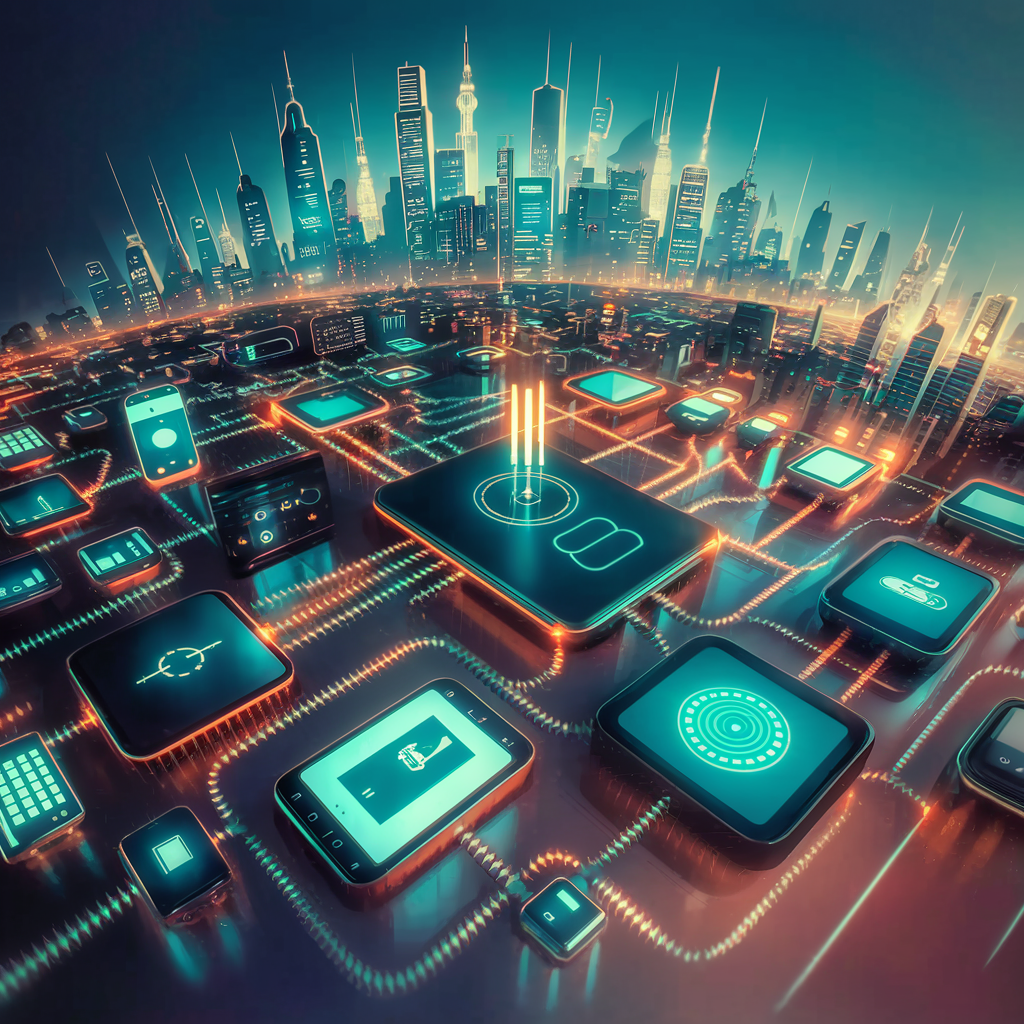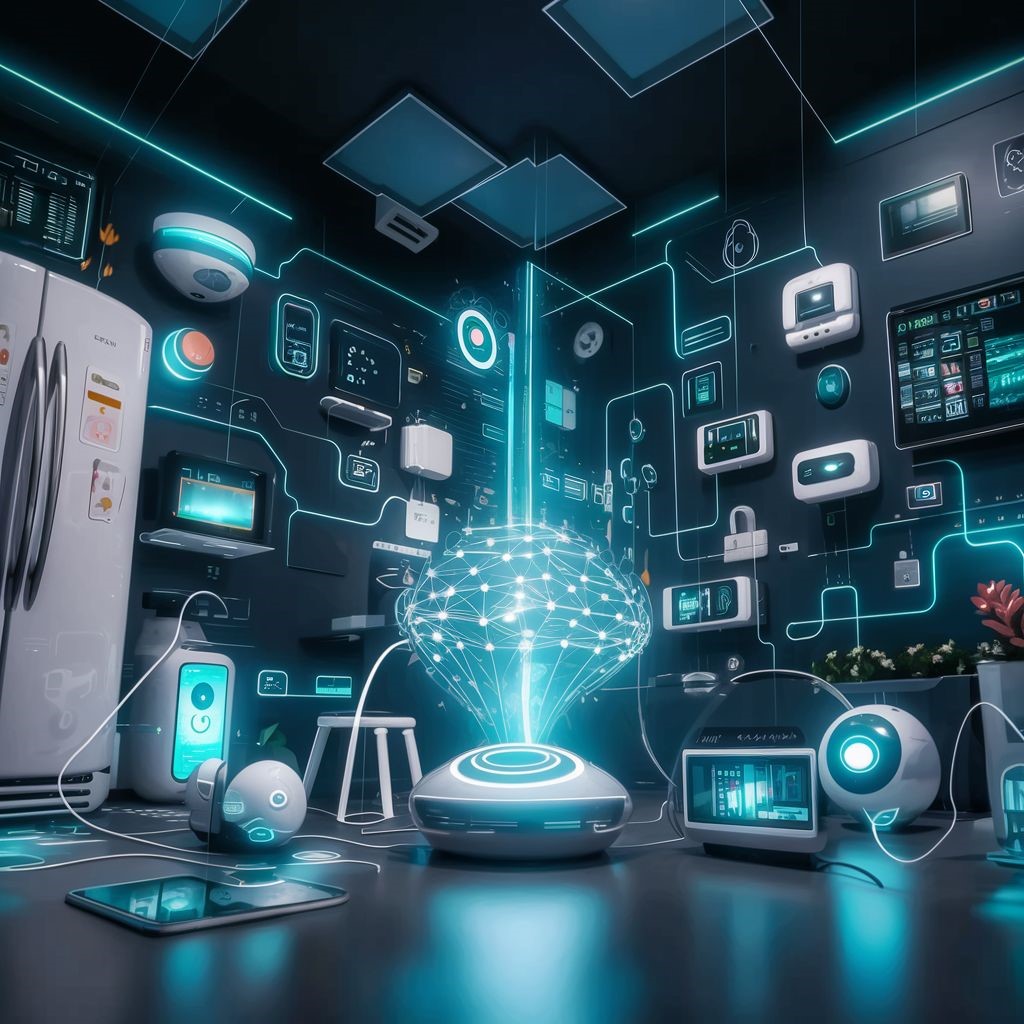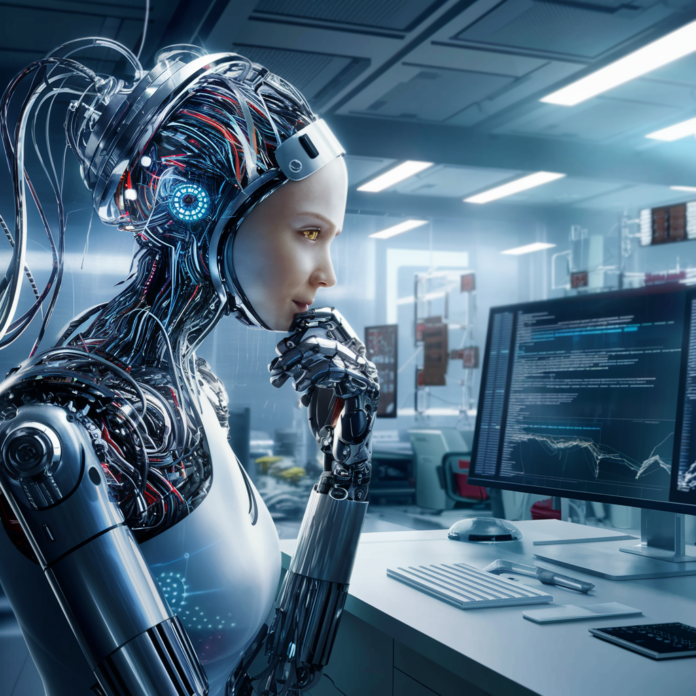In today’s changing sphere of technology, it’s essential to stay updated with the newest breakthroughs. As we make our way through 2024, we see significant advancements in Artificial Intelligence (AI), Internet of Things (IoT), & others. This article will be highlighting the pivotal trends and providing an understanding of their influence on different industries and our day-to-day lives.
If you are planning to integrate technology into your business, reach out to us for a hassle-free collaboration.
Okay, so moving on…
Artificial Intelligence
Artificial intelligence (AI) is driving innovation across sectors, transforming how people work, live, and interact with technology. In 2024, the AI environment will be shaped by disruptive trends that promise to revolutionize intelligent systems’ capabilities and uses.
- Progress in Natural Language Processing (NLP): Natural Language Processing has made significant progress, allowing for more seamless interactions between humans and machines. NLP is boosting communication and content production with tools ranging from chatbots to language translators. Its applications range from automating customer service to creating writing that resembles human speech, altering our engagement with technology.
Example: AI-powered customer support chatbots can now answer complicated inquiries, reply contextually, and identify and respond to emotions in user input.
- AI’s Role in Healthcare: The use of Artificial Intelligence in diagnosis and treatment planning is causing substantial change in the healthcare business. AI systems sift through large databases to identify trends, which aids in early illness identification and individualized therapy. This not only improves patient outcomes, but also accelerates medical research and development.
Example: Diagnostic AI technologies for medical imaging can detect anomalies with more precision than traditional approaches, allowing for earlier intervention and better patient outcomes.
- Ethical Considerations in AI: As AI grows increasingly pervasive in our daily lives, it is critical to overcome algorithmic biases. The industry is increasingly focused on developing AI systems that are transparent and responsible. Efforts are being made to include ethical issues into the AI development process, hence increasing trust among users and stakeholders.
Example: Companies are deploying diverse and inclusive datasets for training AI models in order to decrease prejudice- as well as building algorithms that explain their judgments clearly.
Internet of Things (IoT) Trends
The Internet of Things (IoT) is at the forefront of technology’s ever-expanding landscape, creating a digital tapestry that connects our gadgets, homes, and cities. Let’s uncover the trends impacting the landscape of IoT in the year 2024 and beyond.

- 5G and IoT: The convergence of 5G and IoT is transforming connection and communication. The increased speed and dependability of 5G networks are opening up new opportunities for IoT devices. From smart homes to industrial applications, this collaboration is ushering in a new era of creativity and efficiency.
For example: Smart cities use 5G to improve public services like intelligent traffic control, trash management, and energy distribution, resulting in more efficient and sustainable urban settings.
- Edge Computing: It is developing as a game changer, reducing latency and increasing processing speed by moving computing closer to the data source. This is especially important in applications such as smart cities and industries, where real-time processing is required for maximum performance.
For example: Edge computing is implemented in manufacturing to evaluate data from sensors on the production line. It is allowing for real-time decision-making and improving operational efficiency.
- Security in IoT: With the growth of IoT devices, maintaining their security has become a primary concern. The blogosphere is humming with conversations about the difficulties and solutions for protecting IoT devices. Building a strong and trustworthy IoT ecosystem requires a focus on privacy and data protection safeguards.
For example: IoT security is especially important in healthcare, where connected medical equipment must be protected to guarantee patient safety & data confidentiality.
Emerging Technologies Beyond AI and IoT
A tapestry of emergent technologies develops, altering sectors and rethinking our connection with the digital world. Let’s go beyond artificial intelligence (AI) and the Internet of Things (IoT) to explore the boundaries of transformational technologies.

- Quantum Computing: With its unprecedented processing powers, is on the verge of revolutionizing sectors. From tackling complicated financial issues to improving encryption, quantum computing has the potential to open up new technological frontiers.
- Augmented Reality (AR) and Virtual Reality (VR): Augmented reality and virtual reality continue to fascinate people’s imaginations. These technological advancements are transforming not just gaming experiences, but also education, training, and commercial applications. The immersive aspect of AR and VR is opening up new possibilities for connection and engagement.
- Blockchain and Decentralized Technologies: This technology is expanding beyond cryptocurrencies to include applications in banking, supply chain management, and other fields. The decentralized nature of blockchain improves security, transparency, and efficiency in a variety of operations, paving the path for solutions.
Industry-specific Impacts
These technology trends are driving distinct developments in each industry. Blockchain, for example, is speeding transactions in banking, while artificial intelligence is changing diagnoses in healthcare. Case studies abound, demonstrating successful deployments and giving significant insights for firms wishing to capitalize on new technologies.

- Finance: Blockchain technology has emerged as a driving force behind financial innovation. Aside from its relationship with cryptocurrencies, blockchain is improving regular financial transactions. Smart contracts, enabled by blockchain, automate and execute agreements without the need for middlemen, lowering costs and speeding up operations.
For example, Large financial institutions are using blockchain to provide safe and transparent transactions, improving the integrity of financial ecosystems.
- Education: The convergence of augmented reality (AR) and virtual reality (VR) is causing a transformation in the education industry. These technologies are transforming the traditional classroom experience by providing immersive and interactive learning environments. AR applications, such educational apps and interactive textbooks, improve engagement and comprehension. In contrast, virtual reality (VR) provides students with immersive learning possibilities through virtual field excursions, simulations, and training situations. The end result is a more engaging and effective educational experience.
- Agriculture: Precision farming, powered by IoT and AI, is altering traditional agricultural techniques. IoT sensors capture data on soil health, meteorological conditions, and crop development, giving farmers actionable information for better resource management. AI systems use this information to forecast agricultural production, detect possible illnesses, and optimize irrigation schedules. These advances improve agricultural output, reduce environmental impact, and promote sustainable agriculture practices.
- Manufacturing & Supply Chain: The combination of IoT and blockchain technology is causing a paradigm change in manufacturing and supply chain. IoT devices integrated in industrial equipment and across the supply chain give real-time data that helps to optimize production processes and logistics. Blockchain enables the transparency and traceability of the whole supply chain, reducing the danger of counterfeiting and assuring product authenticity. This integration improves productivity, lowers costs, and fosters trust among stakeholders in the manufacturing industry.
- Retail: AI-powered chatbots and recommendation systems are offering personalized shopping experiences to customers, enhancing engagement and conversion rates. Smart shelves and inventory trackers are examples of IoT devices that improve supply chain management by decreasing stockouts and overstocking. Retailers are using these technologies to create seamless omnichannel experiences that combine online and physical purchasing for greater consumer satisfaction.
Future Outlook
Predicting the future is a difficult task, but specific patterns provide insight into what lies ahead. As these technologies advance, teamwork and creativity will play critical roles in defining the future. The dynamic of the digital scene in 2024 paves the way for a future in which AI, IoT, and developing technologies blend effortlessly into our daily lives.
Here’s how:
- Human-Augmented AI: In the future, AI systems will collaborate with humans, enhancing rather than replacing our capacities. AI systems will get better at recognizing human purpose, emotions, and context, resulting in more intuitive and user-friendly interactions. This collaborative paradigm will find applications in a variety of fields, including healthcare, education, business, and entertainment.
- Quantum Leap in Computing: It is expected to have a substantial influence on the technology environment. While still in its early stages, advances in quantum computing will unleash enormous processing power, transforming industries such as encryption, and optimization issues. As technology evolves, we should expect discoveries with far-reaching implications across sectors.
- Extended Reality (XR) Redefined: Augmented Reality (AR) and Virtual Reality (VR) will evolve further! Extended Reality (XR) will emerge as a more comprehensive word that fully integrates AR and VR into the actual world. This progression will result in immersive experiences that extend beyond gaming and entertainment, with applications in education, healthcare, and beyond.
Bottom Line
Summing Up! The intertwined forces of Artificial Intelligence (AI), the Internet of Things (IoT), and developing technologies have driven us toward a future in which the limits of what we can do are constantly stretched and redefined.
From the sophisticated breakthroughs in AI, where robots grasp language and traverse ethical issues, to the linked world of IoT, where objects interact effortlessly thanks to the power of 5G and edge computing, the technological landscape is lively and dynamic. The convergence of these technologies creates a nexus of possibility that goes beyond what we can imagine. Our trip into 2024’s tech world has been one of discovery, with each amazing development illuminating the road ahead.
Therefore, let’s approach this technological future with curiosity, responsibility, and collaboration. The canvas is large, and we are the ones creating a future in which the only constant is that we will continue to evolve. Welcome to the future; the journey is just beginning!

